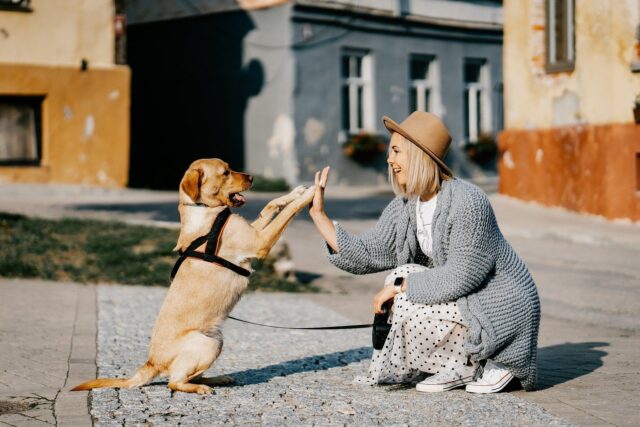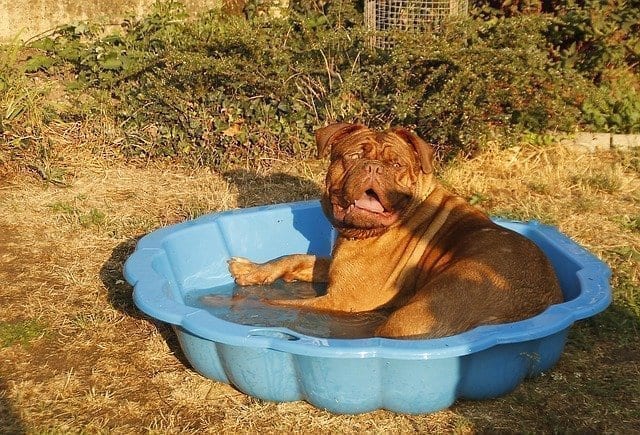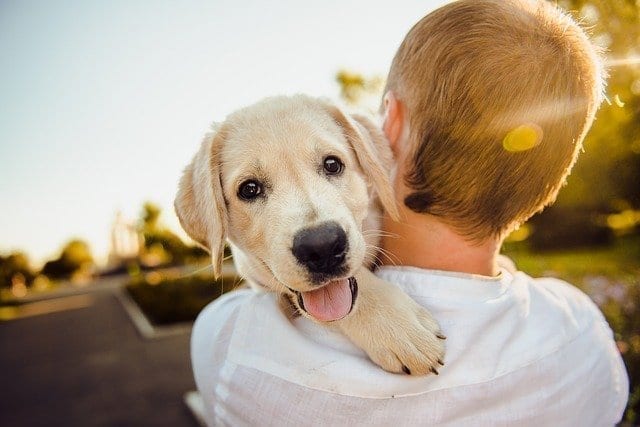Getting a dog is one of the most exciting adventures in life, so congratulations on the decision to grow your family by four furry paws!
We love dogs and want to help you give your pooch the best life ever!
There’s so much to think about before getting a dog, but don’t worry. This two-part guide is designed to help you on your journey to bringing a dog home. We aim to answer any questions you might have about adopting a dog and give you the information you need to make important decisions when it comes to the well-being of your new canine family member.
Before we get down to the nitty-gritty, let’s go over some important things to keep in mind about becoming a canine parent.

Should You Get a Dog?
First things first, are you ready for a dog?
Consider your life for a moment. Is it conducive to the addition of a canine family member? Here are a few issues to think about before you adopt a dog.
Do you have the time and patience?
Does your job require long hours away from home? Or is travel involved?
Aside from your career, what other commitments do you have? Are your days so jam-packed you barely have time to think? Essentially, ask yourself this…do you have time for a dog in your life?
Dogs require the promise of your time. Do your lifestyle and heart permit you to give a dog a huge amount of time for many years to come? Adopting a dog is a commitment you can’t walk away from. That fluffy darling will need you for as long as she lives.

Puppies are adorable and snuggly, but they’re just babies and need tons of care. They require much supervision and training, both requiring time and patience. And as your pup grows into adulthood, he will still need love, time, and energy to thrive. When your active hound ages into senior dog status, she’s going to need a different kind of care to keep her comfortable and happy as her body slows down. You’ll have to be willing to make your home a mobility-friendly place and not mind dragging yourself out of bed in the late hours of the night for extra potty runs.
Before getting a dog, stop and consider if the life you live would bring both you and a dog joy.

Are you willing to take on the financial responsibility of being a dog parent?
Dogs require a substantial and long-term investment of financial resources when it comes to their care, and we’re not just talking about annual or emergency veterinary visits. Your hungry hound will always need food, and it’s not unusual to drop 50 bucks on a sack of dog chow. A dog’s size will determine how much money and how often you have to buy food to keep their tummies full and happy. If your pup has food sensitivities or certain issues that require specialty food or supplements, those will be an absolute must and should be budgeted accordingly. Same with any medications your dog might need.
And don’t forget the toys and treats you’ll want to get while you’re at the pet store. Plus, beds, blankets, and, well, you get the point. There will be lots of supplies your dog requires and all the adorable extras you’ll want for spoiling your fur baby. Though you’ll spend a good deal, a dog is the best investment you’ll ever make!

How much money do you think dog parents spend on their dogs yearly?
According to 2020 data compiled by MoneyWise.com, the average cost of responsibly caring for a dog is $4,063.32 a year. That’s not cheap!
Will you stay active for your furry friend?
Every breed requires activity. From puppyhood to senior days, canines have to get their exercise. Puppies need more play than aging adults, but the seniors still need activity. This applies to people too! You and your dog both need movement and exercise to stay healthy, so make this part of your considerations when getting a dog.
Certain breeds need more exercise and stimulation than others, but even lazier dogs need some activity in their life. This begs the question, do you need an active dog who loves to run or maybe one who would enjoy leisurely walks and the lazier side of life?

Once you’ve looked over these aspects of dog ownership and decided you’re ready for this major commitment, then congratulations! The joy of having a dog in your family is so completely heart-encompassing, you won’t even think twice when your dog needs extra special care.
In fact, you’ll be happy to give your dog everything he needs in life and more. As much as we take care of them, dogs give us more in return, and life with canine companions is one of the greatest joys ever!
Now it’s time to decide what type of dog is right for you.

What Dog Breed is Right for You?
Now that you’ve thought about things and you’re ready to get a dog, you need to decide what kind of dog will fit best into your home. Here are some thoughts to ponder about choosing a dog breed (or mix of breeds), including what age range is right for your family.
Puppy, Adult, or Senior
When it comes to adopting a dog, you’ll need to decide if you want to adopt a puppy or adult dog. Did you know senior dogs have a harder time being adopted than younger ones? Perhaps you may be interested in giving a senior a loving home for their remaining years. Or, do you want to watch a puppy grow into its paws over the years?

Size Versus Your Space
Consider the size of your home and how a dog will fit into that space. Some dogs are huge, while others are perfect little lapdogs. A Great Dane is going to need so much more room to stretch out than a Chihuahua.
And what about the size of your outdoor access? Is there yard enough for a big beast to run or a park nearby? Bigger dogs will need more green space than little pups, but even the tiny ones need some outdoor space to feel free.
Kids and Other Critters
Think about who lives in your home. Are there children? Other animals?
If so, one important consideration when adopting is matching your family with a dog that likes children. Some dogs’ temperaments or past experiences make them not ideal for the noise and everyday chaos of small kids. Example? Rottweilers would generally prefer to be a spoiled only-fur-child rather than share mom and dad with children. But a Beagle will usually be happy to play with the kids.
Keep everyone safe by researching dog breeds that do well with children and other animals.

If you already have other animals in the house, the same research will be required. Like the Belgian Malinois, some breeds are happier as working dogs and need a home without other animals. But if you want a dog who’s just as big an animal lover as you, have a look at the Golden Retriever.
Activity Level
We’ve already covered activity levels, but it bears going over again. Is your family one that spends most days outdoors? Or does your household prefer a quiet life inside?
All dogs need exercise, but some breeds require more than others. For example, if you love to lie around and read or live the gaming life, maybe a chill Basset Hound is a better fit than a Border Collie who always wants to be busy.

There is so much to think about before getting a dog!
But all the research and consideration is so worth it once you and your new dog are happy together. And we’re getting so much closer to making that dream a reality. Now, you need to decide if you’ll adopt from a rescue or purchase from a breeder.
Should You Adopt a Dog from a Rescue or Buy from a Breeder?
We’re partial to the idea of ‘Adopt, Don’t Shop’ as there are so many dogs in shelters looking for homes, but whether purchasing or rescuing a pup, every dog matters and they all deserve love!
If you’re set on a certain breed, but not sure about buying from a breeder, there are ways to rescue specific breeds. Plus, check out these top breeds most commonly found in animal shelters.
If you do choose to buy, take caution when choosing a breeder. Sadly, some people don’t care about the value of canine lives and will exploit them to make money. They overbreed dogs and house them in cruel, inhumane conditions. As a result, the puppies are often afflicted with genetic diseases, viruses, parasites, and more. Be careful not to fall prey to any of these cruelty peddlers.
If you do suspect you’ve had contact with a puppy mill or an unscrupulous breeder, contact The Humane Society of the United States by calling 1-877-MILL-TIP. The HSUS also offers tips on finding legitimate breeders.

Visit with Furry Friends Before Bringing Them Home
If you can’t quite make up your mind about what kind of dog is right for you, visit with lots of different doggos! Head to the local animal shelter or adoption events and let the shelter staff guide you towards the dog that best fits your family’s needs.
Looks Aren’t Everything
A pup you may normally overlook could be a perfect match. Looks aren’t everything, so be open to visiting with all different dogs. Finding a dog that suits your personality and lifestyle is much more important than looks. Besides, all dogs are beautiful!
Give the Shy Guys a Chance
Shelters are stressful places. Just because a dog is timid and introverted during your meet-and-greet does not mean he or she won’t blossom in a stable home. If a particular dog tugs your heartstrings, talk to the adoption coordinator about an in-home trial or foster-to-adopt situation. You might find a diamond in the ruff!

Now that you know all the considerations that go into choosing a dog, it’s time to prepare for bringing your new family member home in Part II of our guide!
 Toledo, United States.
Toledo, United States.